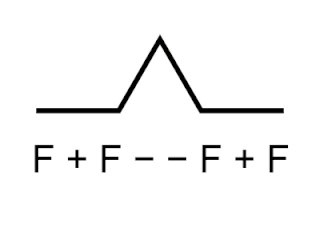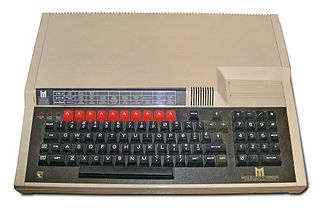
The Acorn Electron was a lower-cost alternative to the BBC Micro educational/home computer, also developed by Acorn Computers Ltd, to provide many of the features of that more expensive machine at a price more competitive with that of the ZX Spectrum. It had 32 kilobytes of RAM, and its ROM included BBC BASIC II together with the operating system. Announced in 1982 for a possible release the same year, it was eventually introduced on 25 August 1983 priced at £199.

Logo is an educational programming language, designed in 1967 by Wally Feurzeig, Seymour Papert, and Cynthia Solomon. Logo is not an acronym: the name was coined by Feurzeig while he was at Bolt, Beranek and Newman, and derives from the Greek logos, meaning word or thought.
BBC BASIC is an interpreted version of the BASIC programming language. It was developed by Acorn Computers Ltd when they were selected by the BBC to supply the computer for their BBC Literacy Project in 1981.

The Kansas City standard (KCS), or Byte standard, is a data storage protocol for standard cassette tapes at 300 bits per second. It originated in a symposium sponsored by Byte magazine in November 1975 in Kansas City, Missouri to develop a standard for the storage of digital microcomputer data on inexpensive consumer quality cassettes. The first systems based on the standard appeared in 1976.
Acornsoft was the software arm of Acorn Computers, and a major publisher of software for the BBC Micro and Acorn Electron. As well as games, it also produced a large number of educational titles, extra computer languages and business and utility packages – these included word processor VIEW and the spreadsheet ViewSheet supplied on ROM and cartridge for the BBC Micro/Acorn Electron and included as standard in the BBC Master and Acorn Business Computer.

The BBC Master is a home computer released by Acorn Computers in early 1986. It was designed and built for the British Broadcasting Corporation (BBC) and was the successor to the BBC Micro Model B. The Master 128 remained in production until 1993.

The Acorn System 1, initially called the Acorn Microcomputer (Micro-Computer), was an early 8-bit microcomputer for hobbyists, based on the MOS 6502 CPU, and produced by British company Acorn Computers from 1979.
ViewSheet is a spreadsheet program produced in the 1980s by Acornsoft for use with the BBC Micro and Acorn Electron microcomputers. It was distributed as a pre-installed ROM with some computer models, such as the Master. ViewSheet was written by Mark Colton.
Unified Emulator Format (UEF) is a container format for the compressed storage of audio tapes, ROMs, floppy discs and machine state snapshots for the 8-bit range of computers manufactured by Acorn Computers. First implemented by Thomas Harte's ElectrEm emulator and related tools, it is now supported by major emulators of Acorn machines and carried by two online archives of Acorn software numbering thousands of titles.

The Machine Operating System (MOS) or OS is a discontinued computer operating system (OS) used in Acorn Computers' BBC computer range. It included support for four-channel sound, graphics, file system abstraction, and digital and analogue input/output (I/O) including a daisy-chained expansion bus. The system was single-tasking, monolithic and non-reentrant.

Snapper is a clone of the Namco arcade game Pac-Man programmed by Jonathan Griffiths for the BBC Micro and released as one of the launch titles for Acornsoft in 1982. It was also one of Acornsoft's launch titles for the Acorn Electron in 1983.

A BBC Micro expansion unit, for the BBC Micro is one of a number of peripherals in a box with the same profile and styling as the main computer.
Shadow RAM, on the Acorn BBC Micro, Master-series and Acorn Electron microcomputers is the name given to a special framebuffer implementation to free up main memory for use by program code and data. Some implementations of shadow RAM also permit double-buffered graphics.
The sideways address space on the Acorn BBC Microcomputer, Electron and Master-series microcomputer was Acorn's bank switching implementation, providing for permanent system expansion in the days before hard disk drives or even floppy disk drives were commonplace. Filing systems, application and utility software, and drivers were made available as sideways ROMs, and extra RAM could be fitted via the sideways address space.

The British Broadcasting Corporation Microcomputer System, or BBC Micro, is a series of microcomputer designed and built by Acorn Computers Limited in the 1980s for the Computer Literacy Project of the BBC. Designed with an emphasis on education, it was notable for its ruggedness, expandability, and the quality of its operating system. An accompanying 1982 television series, The Computer Programme, featuring Chris Serle learning to use the machine, was broadcast on BBC2.
The Advanced Disc Filing System (ADFS) is a computing file system unique to the Acorn computer range and RISC OS-based successors. Initially based on the rare Acorn Winchester Filing System, it was renamed to the Advanced Disc Filing System when support for floppy discs was added and on later 32-bit systems a variant of a PC-style floppy controller.

Acorn C/C++ is a set of C/C++ programming tools for use under the RISC OS operating system. The tools use the Norcroft compiler suite and were authored by Codemist and Acorn Computers. The tools provide some facilities offered by a fully integrated development environment.
Arthur C. Norman is a British computer scientist, and Fellow of Trinity College, Cambridge, where he has previously been a Director of Studies for Computer Science.
Acorn System BASIC and Atom BASIC are two closely related dialects of the BASIC programming language developed by Acorn Computers for their early microcomputers like the Acorn System 3 and Acorn Atom. Developed in-house, they have a number of significant idiosyncrasies compared to most BASIC dialects of the home computer era.












